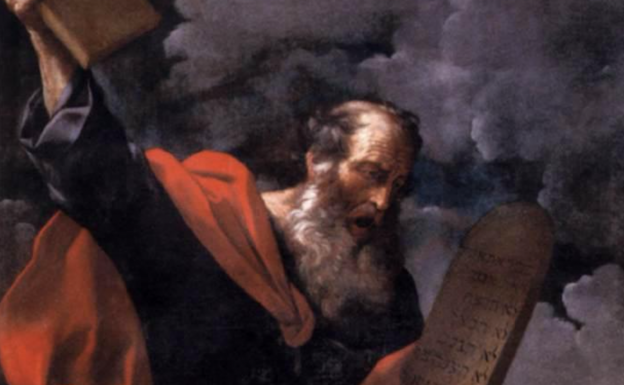In my childhood church’s library was a late-80s-early-90s book with “cool” kids looking like they walked off the set of Fresh Prince of Bel Air called “If the Devil Made You Do It, You Blew It”. While I never read the book, it actually covered dealing with various temptations rather than simply falling back on the lie that “the devil made me do it.” Someone should have given Aaron a copy.
So far in Exodus 32 we have seen the Israelites create and worship and idol, and Moses intercede on their behalf before God up on Mount Sinai. In verses 15 to 24, Moses descends the mountain to confront Israel, and specifically Aaron, on their sinful idolatry. In this passage, we see a reminder to confront the sins in our own lives, and rest in Christ who is the only true and completely faithful priest of God.
After interceding before God for the Israelites, Moses descended from the mountain to the Israelite camp below (v.15). Moses carried two copies of The Testimony on stone tablets, which in paintings we associate with the Ten Commandments (though it may have been the entire covenant agreement, or the key requirements rather than just the Commandments). Exodus pains to tell us that these stone tablets were hewn by God, to show their great value and importance (vv.15-16).
Unlike Moses, Joshua did not have the knowledge of what had gone on below. Joshua believed that the noises suggested the Israelites were under attack, perhaps again by the Amalekites (v.17).
However, Moses knew that this was not the case, and that the noises were not the shouts of warfare but of festivities (v.18); the wild and immoral worship of the golden calf at the foot of the mount (cf. v.6).
Once Moses reached the Israelite camp, he furiously judged the sinning Israelites in the camp. We read that as he saw the golden calf and the pagan revelry, “Moses’ anger burned hot” (v.19) just as God’s anger at their sin is described in verse 10. Moses was righteously indignant at what he saw.
The Israelites, who a little over a month previously had sworn to keep the covenant with God, had already broken the agreement. To show just how disastrous this was, Moses “threw the tablets out of his hands and broke them at the foot of the mountain” (v.19). The broken covenant was symbolically pointed at by the broken tablets.
Next Moses took the golden calf, burned it with fire into ashes, ground it down to powder, threw it in the communal water, and made the Israelites drink it (v.20). The Israelites were forced to taste the bitterness of their sin and acknowledge the consequences which may come.
After dealing with the people as a whole, Moses confronted Aaron on his role and leadership of the idolatrous masses. The people ultimately had looked in some way to Aaron for leadership in Moses’ absence, and he had led them into “a great sin” (v.21).
Aaron attempted to deflect the blame away from himself. While submissively acknowledging Moses as his leader, he effectively tells Moses to calm down (v.22). Then, Aaron indicated that the people forced him to act, mirroring the account of verse one but ignoring Aaron’s failure to assert leadership (v.23).
Finally, and most absurdly of all, Aaron suggested a miraculous origin for the idol. “I threw [the golden jewelry] into the fire, and out came this calf” (v.24). Magic!
By blaming, deflecting, and minimising his role in the affair, Aaron not only showed how any sinful human excuses their own sins, but the inability of any sinful human to perfectly represent humanity in offering sacrifices to God.
Moses confronted Aaron and the Israelites with their sinfulness in engaging in idolatry. They had no acceptable excuse, and they were all to varying extents culpable in the sinful acts of that day. They needed to accept the consequences that were to come.
We act in exactly the same way. We deflect and minimise our sins, or our part in them. Someone else is to blame, and we were just carried along or powerless to stop them. “The Devil made me do it”. It wasn’t that big a sin – calm down!
The reality is that when we break one of God’s commands, we break the lot (James 2:10). No sin is just a little sin. All sins are rebellion against the King of Kings.
Like Aaron and Israel, we need to confront the reality of our sins and what it means for our relationship with God. Until we acknowledge our sins, we offend God and grieve the Holy Spirit. We must destroy our idols. That may mean, like Israel, having to drink the ground powder of our sins and accept the bitterness of the consequences it has on our lives.
Thankfully, while Aaron failed as a priest for God’s People, Jesus succeeded as a sinless priest, reconciling us to God. If we acknowledge ourselves as sinners and seek God’s mercy, he will pardon us.


